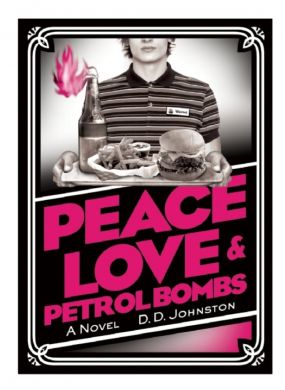If somebody you know writes a novel with strong autobiographical influence then one of the attractions of reading it is to find out and speculate about whom he writes about, how much of the story has really happened and in what ways it got changed and what has been left out and why. Out of this reason I did enjoy reading the book. So I liked the best reading about the political protests and parts which were similar to things I experienced, like when the author sets the scene at a London squat or describes the Anarchist Bookfair.
Personally, I found the writing style really good and the plot has enough tension for the reader to carry on reading one chapter after the other immediately. It is difficult to put the book aside, it’s a real page-turner.. The book also has a good narrative with jumping forward and back in the timeline like “Pulp Fiction”, but the end is left disturbingly open.
So is Deanne’s suicide, you wonder why she did it and what happened to her child, but no explanation is given.
I have also difficulties in determining who the target audience is for the book. At the start, particularly when it comes to a lot of swearing in Benny’s Burgers Bar, I thought the book would be aimed at not quite yet politicised teenagers. But later on, on page 177 when we finally encounter the first petrol bomb, I considered it being written for the already long-term activists, as there are hardly any factual explanations anymore about the aims and objectives of the protests and the strategy employed or even why Wayne was there. I don’t think it even mentioned that it was an EU summit and that protests at that time were vaguely about the enlargement of the EU. “Singled out for criticism were the EU’s refugee and immigration policies, complicity in the war in Iraq, and slashing of pensions,” says Indymedia about the 2003 protests then but in the book explanations for the protests are rare – as is also suddenly the appearance of a refugee support demonstration when the topic hasn’t been mentioned before. However, for long-term politically active people, who know that kind of stuff already, the book is not empowering nor encouraging them in their struggle either as towards the end the protagonist becomes depressed and disillusioned with activism. Not once, but twice, and both times the questions are left open and there is no closure for the reader yet again. Out of these reasons, I would find it difficult to review or recommend the book in more mainstream left-leaning or liberal publications and it might stop the book from becoming commercially successful.
So to summarise:
The book really made me want to smoke again. I regret not knowing what Wayne did at Gleneagles in 2005 and 2007 in Heiligendamm.
I found the book too (working)class obsessed to the point of distraction. Although in Britain, with the Queen and Thatcherism and all that, the class system is regarded as an important and sacrosanct issue. From my experience there will always be a class system; not necessarily about the accumulation of wealth but for example about the level of education available to individuals or even in political circles, for example about the level and practice of politicization and trust. I found it very enlightening when finding out that the children of university-educated professionals in the GDR were not allowed to study themselves in order to prevent an upper or even middle-class system. However, there was still a political elite formed as it did not apply to the children of polit officials ranking more or less highly.
I found it a deeply unfair and unjust rule.
Also in the book, I missed the description of the local protests in Edinburgh during that time, like Foot and Mouth during Genoa in 2001 and of ‘ACE’ and similar. Personally, for me, Wayne’s character seems to have some gaps between Benny’s Burgers and sociology studies – I missed him getting empowered in a practical way at that time. He often seems too passive as if life was done to him rather than he actively living it.
Missed at the description of the Mayday 2000 protests is also the raid of the petrol station, the break-out of parliament square, the compost toilet and the attack on McDonald’s and the conference the day before. Maybe that will be included in one of D.D.Johnston’s next books.
